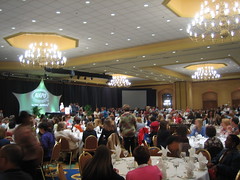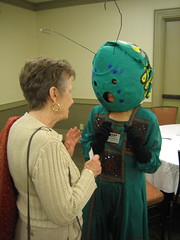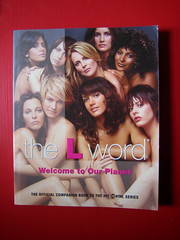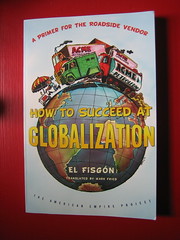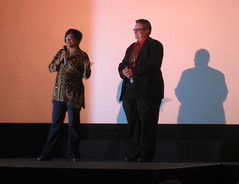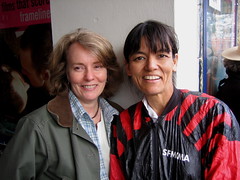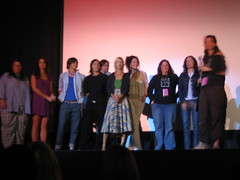The Seven Habits of Highly Subversive People
As the corruption of the Bush administration unfolds for all to see, I find myself wondering why people are so complacent? Why are we not abuzz with discussion about the outrages committed by this administration? Apparently we are too fractured in thought to really put it all together. People, as my mother would say, can't think their way out of a paper bag. And the powers that be like it that way which makes thinking a subversive act that everyone can participate in.
Habit #1. THINKING
Here are some paper bags that I have attempted to think my way out of.
The New Age Paper Bag
Much that was revolutionary in the human potential movement of the '60s spurred us to great strides in personal development and self-actualization, especially here in California. We took workshops to liberate ourselves from destructive cultural messages and parental tapes; we were offered books to empower ourselves to reach our full potential; we quit smoking, embraced low-fat diets and took up yoga; we "worked on ourselves" and learned negotiation techniques to improve our couples relationships. A whole industry of self-help books and page-a-day calendars with daily affirmations was spawned.
Within the scope of the New Age movement we were able to create a parallel universe of good in our own lives, separate from the degradation going on in the world at large, especially if we were in business for ourselves. How America loves the self-employed. Do what you love and the money will come. Think positively and you will attract what you want into your life. The cosmic shopping channel is open 24/7 for you to visualize your dream of success down to the car you drive and the clothes you will wear.
How convenient for the agenda of globalization that this message negates our ability to criticize capitalism. It has laid us wide open for the cheerleading of trickle down economics and self-congratulatory, post-Soviet collapse rhetoric. Okay, so we have to leverage our own health care and pension plan, pay for disability insurance and liability insurance, then pay even more steeply for our self-actualizing workshops, certifications testing and business networking associations. We must market ourselves constantly, take only unpaid vacations, compromise our values when necessary, risk projecting conflicting messages of political or religious affiliation to our client base and manage our fears when the work isn't there. That's the price we gladly pay for this glorious opportunity to be our own boss. Meanwhile what's all this fuss about globalization and free trade? Isn't it all good? Shouldn't trade barriers be brought down so we can continue this wonderfully business-friendly atmosphere?
The New Age Paper Bag separates us from historical perspective and context. This parallel universe narration has clipped our ties to the consequences brought on by the nation that represents us in the world. We are, after all, not supposed to dwell on the negative unless there is a solution immediately at hand. Which brings me to the next habit of highly subversive people.
Habit #2 UNDERSTAND THE BIG PICTURE, THE GLOBAL SUPPLY CHAIN OF EVERYTHING THAT YOU TOUCH AND THEN SOME, THE INTERCONNECTEDNESS OF ALL THINGS AND I DON'T MEAN JUST THE COSMIC GOOD STUFF BETWEEN YOU AND THE DIVINE. IN THE BEGINNING THERE WILL BE NO SOLUTION TO THE DEPRESSING REALITY OF IT ALL. GET USED TO IT. BETWEEN DESPAIR AND HOPE LIES THE MOTIVATION TO CHANGE.
One of the few popular filmmakers attempting to help viewers understand a bigger picture is Michael Moore. His film "Sicko" manages to throw in many of my pet issues regarding corporate buyout of our government, the fear mongering of government propaganda, the repression of alternatives by profit driven corporations and the plain disregard of decent people by our national policies. He embodies in his script, subversive acts of civil disobedience by going to Cuba to raise awareness of these issues.
The Techno-fix Paper Bag
Speaking of solutions, we love the potential offered by technology. Somewhere, somehow, someone will come up with a brilliant gadget that will solve everything, make our lives easier and slip seamlessly into our current lifestyle with no effort on our part. That is the supposed saving grace of the "free market." The US currently positions itself as the brains at the top of the food chain of production. Americans, the lucky educated ones, are offered the plum high paying jobs of innovation that are not as yet outsourced offshore. To stay competitive we are urged to funnel all the smarts and creativity of our human potential into this gadget-designing piece of the action.
The Techno Paper Bag is bottom line about enabling the disposable economy. Capitalism thrives on disposability. Throw it away and buy the next big thing. Got e-waste? Well then make it go away magically through better high tech recycling. Create more efficient, more recyclable wonderstuff, or at least something way cooler than last year, then make the whole world want it with slick soothing advertising. (I just Fed-Exed an iPhone to my publisher in Bangkok so he wouldn't have to wait until 2008 when it will be released there.)
The underlying pitfall of the disposable/product-for-every-occasion mentality is that it robs us of our own individual inventiveness and creativity; the day-to-day practice of our imagination is co-opted into acts of shopping. The very thought that we could make do or make something for ourselves or find a local artisan to make it for us, threatens the growth of profit driven multi-national corporations. This prompts the third habit of the highly subversive person.
Habit #3: FIX, MAKE OR BAKE STUFF YOURSELF, BECAUSE IT STRENGTHENS YOUR INDEPENDENCE OF THOUGHT FROM THE SOUL ROBBING, IMAGINATION SUCKING, CORPORATE PRODUCTION OF STUFF. CUT OFF OR COVER THE LOGOS ON YOUR BAG, SHOES, CLOTHES. REPURPOSE A PRODUCT AND NAME IT AFTER YOURSELF.
WEAR A HOMEMADE COSTUME.
A close cousin to the Techno-Fix paper bag is:
The Freedom of Individual Choice Paper Bag
Here's another mega-platform for selling stuff through the illusion of choice. What turns you on? What will set you apart? What will make you happy?
Catherine likes to watch House Hunters, a cable TV reality show about people searching for their next dream home. I couldn't figure out the appeal of this show since we aren't looking for another house. The repetition of the plot, the cheesy low production values and the amateur actors expressing their rehearsed joy at the inevitable climax of closing the deal reminded me of something. Suddenly it came to me.
"I know what this is," I said gleefully, "it's porn—shelter porn." Catherine did not entirely appreciate the metaphor.
Shelter porn, food porn, makeover porn, Queer Eye For The Straight Guy, the designer clothes on your sitcom stars. When I watch movies at home I call out "Product Placement" whenever I see a recognizable brand name item. Thus the fourth habit.
Habit #4: KNOW YOUR PORN SO THAT YOU CAN UNDERSTAND HOW YOU ARE BEING TOLD WHAT TO DESIRE.
Advertising is now no longer restricted to just brand names and individual products. MasterCard will finance your trip to Europe, so that you can experience the "priceless" memorable moment of your life. We have Wells Fargo to tell us that our wants are inevitably material ones. "Someday a new couch" "Someday a spare bedroom." Don't you long to hold up a card that says "Someday world peace"?
Which brings me to the final and biggest paper bag of them all. It is so big it resembles an architectural monument, a sort of post-modern, Dwell magazine paper bag covering our national consciousness.
The Democracy Paper Bag
I've a colleague whose mother is from East Germany. When the Bush administration was yammering to go to war with Iraq, she was aghast at the instant patriotism of her neighbors.
"Don't you see? This is how Hitler happened?" she said to them in exasperation. I had to laugh in my empathy with her perspective. Yes, it takes a village to raise a Hitler. Let us not forget that Hitler was operating in a democracy. And I don't buy it that the Germans were somehow culturally flawed and therefore more vulnerable to Hitler. Disconnected as we are from political context, we have been just as easily fooled into allowing our civil rights and political power to be eroded, bit-by-bit, under the guise of national security.
We are so secure in our identity as a democracy that we forget to question if it is actually functioning. We believe steadfastly in our ability to make change by peaceful protest and the power of one vote.
"We'll vote for a styrofoam box," quipped my friend Martine, "just as long as it's a Democrat."
Arundhati Roy, author of the best-selling novel The God of Small Things, pointed out, in one of her essays on empire, that when the Ghandhian legacy of peaceful protest is dismissed, we are leaving the people with no choice, but to turn to other more violent means. It's the sort of sentiment one wants to bat away before it has a chance to take hold. Still there is a certain chilling logic to it?
The Bush administration is answering to nobody but themselves, care about nobody but themselves. They have changed laws to benefit the corporations from which they came and to which they will return. They care not for due process. Our justice system is not holding them accountable; nobody seems to be holding them accountable. The media is full of apologists (save for Keith Olbermann).
Our leaders count on our good behavior, our staying in our seats and acting on our democratic ideals—yelling occasionally at our TV. We know they are crooks and we know they are liars, yet we still won't think the worse of them. For to think the worse of them would be to threaten the very existence of our democracy and have to resort, instead, to marching on Washington as a lynch mob.
How else to explain the reluctance of people to entertain the complicity, on the part of these rogue leaders, in the attack on the twin towers? The subject is made taboo. It is just too scary to accept, but not the first time such a false flag strategy has been used. (The Nazis also staged a false flag operation called the Himmler Operation to justify the invasion of Poland.) To dislodge democracy demands severe techniques.
Having been raised in a country that often installed its prime minister with a military coup, I do not seem to have the same attachment to this identification with the sacred cow of democracy. My parents did not vote for our leaders (until we came here) thus my core identity is not threatened by the idea that I might not be living in a democratic country. Much as I value democracy, it is easier for me to question it when it seems to be broken. This brings me to habit #5.
Habit #5: SEEK CONTEXT. DON'T SETTLE FOR THE EASY SHORT ANSWER. STAND FOR SOMETHING RISKY. MAKE A STATEMENT THAT EMBODIES COMPLETE SOCIOPOLITICAL NARRATIONS.
Habit #5 is the manifestation of Habit #1: THINKING. It opens up the arena for all kinds of creative story telling and story embodying art. Habit #5 has inspired my most creative work. My favorite being the creation of my alter ego, the Caterpillar of Perpetual Consumption.
I've met passionate radical activists on street corners who don't seem to be getting their message across because the culture they are addressing has not yet been nurtured into receptivity to their ideas. Thus they are easily dismissed. I start small and find out what matters to the company I keep, which brings me to:
Habit #6: START WHERE YOUR AUDIENCE IS
At our last business networking meeting, our speaker was an image consultant. I cannot seem to take this career choice seriously so I was surprised at how passionate my carpool mates were about her flaws. It struck me that that if my colleagues were paying this much attention to the clothes people were wearing, then I could easily get my message across by accessorizing my "image" with a symbol of my pet campaigns. Thus my Spork Manifesto. (The spork is a combination spoon and fork.)
Because of my feelings about the role of disposability in our journey to planetary hell, I started carrying with me a midnight blue spork (along with my pocket knife), to ward off those horrid plastic utensils that pop up. The spork led to a portable fold flat cup (of a cerulean blue) to avoid those styrofoam and paper cups that appear at meetings. Having gone that far, I threw in a plate as well (of deep speckled blue enamel). It didn't really take up that much more room.
Thus equipped with my color-coordinated kit, I was ready for the next business event involving food served on disposable plates. As I visually walked my talk, the picnic set in my hand became a classic ice breaker for people to talk to me about being green and recycling, and for me in turn to lead them beyond the incomplete thinking of recycling to my theory on the evils of the disposable consumer paradigm as described above.
I, now, leave you with my final subversive habit.
Habit #7: IMAGINE. DISRUPT. DISTURB. DESTABILIZE. BITE THE HAND THAT FEEDS YOU.
Or in my case, I bite the hand that reads me.
Bibliography
Many of the ideas in this piece were informed and inspired by the following book
The Middle Mind: Why Americans Don't Think For Themselves, by Curtis White.
I was also adversely informed by the shallow, unabashedly pro-capitalist and muddled thinking of The World Is Flat, by Thomas Friedman
And the intriguing, but ultimately shallow thinking of The Black Swan: The Impact of the Highly Improbable, by Nassim Nicholas Taleb
I was properly informed by the following exhaustively researched books:
The Bu$h Agenda: Invading The World One Economy At A Time, by Antonia Juhasz
Against Empire: A Brilliant Expose of the Brutal Realities of US Global Domination, by Michael Parenti
The New Pearl Harbor: Disturbing Questions About the Bush Administration and 9/11, by David Griffin
Crossing The Rubicon: The Decline of the American Empire At the End of the Age of Oil, by Michael C. Ruppert
Shoveling Fuel For A Runaway Train: Errant Economists, Shameful Spenders And A Plan To Stop Them All, by Brian Czech.
And I was sustained by
Confessions of an Economic Hitman, by John Perkins
An Ordinary Person's Guide to Empire, and War Talk, by Arundhati Roy
How To Succeed At Globalization: A Primer For The Roadside Vendor, a narrative cartoon by Mexican national, El Fisgon
And JK Rowling for reminding me that children innately understand totalitarianism, thus the subversive and imaginative nature of the Harry Potter series in the grand tradition of child empowering childrens books.
Also posted at the energy bulletin
Labels: Consumerism, Disposables, New Age, Subversive Activism
